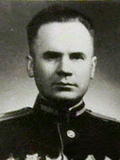Oleg Penkovsky, Six Breaths and World Destruction May 31, 2010
Author: Beach Combing | in : Contemporary , trackback
Beachcombing has never quite known what to make of Oleg Penkovsky, the most important double agent run by MI6, indeed by any power in the Cold War. Was he self-seeking? A traitor? A hero? These are puerile questions: he was probably all three. But now for a curiosity that is more amenable to interpretation. Beachcombing has recently learnt that this extraordinary man, who passed the most desperately important information to the West in the run up to the Cuban Missile Crisis, brought the world to the brink of nuclear destruction – Peter Hennessy Secret State, pp. 42-43.
Beachcombing should here remind any younger readers – those lucky ones who did not grow up dreaming of mushroom clouds – that this was a time when the West was worried that the Soviet Union would carry out a surprise nuclear attack: and helpfully the Soviet Union was convinced that the West was considering a similar tactic. In this hideous climate Penkovsky and his MI6 handler had arranged a signal should a Soviet attack ever be on the cards: Penkovsky would telephone, breathe three times and then ring a minute later to breathe three times again.
Beachcombing’s first reaction on reading this was that a pervert with access to a Moscow telephone could have inadvertently set off the Third World War. But then Beachcombing thought of that poor handler, Gervase Cowell (obit May 2 2000) and how his blood would have run cold if such a phonecall had ever come.
And then it did…
November 2 1962 the British handler picked up his phone and received the terrible warning. If he had followed protocol then presumably the ambassador would have been informed – Cowell was run out of the British Embassy in Moscow – and an urgent message would have been sent back to London with who knows what consequences. As Hennessy points out British Vulcan bombers were still on alert following on from the confrontation over Cuba.
But Cowell did not follow protocol. Hennessy established in a conversation with the MI6 agent (‘[s]hortly before he died’) that Cowell had already decided (correctly) that Penkovsky was compromised and that he had been arrested. The phonecall then could not be relied upon.
Hennessy reflects on Cowell’s good sense. But Beachcombing cannot help thinking of another question and would be grateful if a reader could enlighten him: drbeachcombing[AT]yahoo[DOT]com Why would the Soviets risk sending such an extraordinarily dangerous message to the West at such an insanely dangerous moment?
Here was a pivot in history. If Cowell had acted differently and the Brits back home had made the wrong calls then the village of Little Snoring and all that Beachcombing holds dear would have evaporated in radioactive dust.
We cannot resist ending this piece with reference to Penkovsky’s death. He was, of course, executed after being filmed Soviet-style confessing all. But how did he die? Beachcombing would like to think with a gunshot wound: quick and clean – a warrior’s death. However, Viktor Suvorov, an admittedly controversial figure, alleges (Inside the Acquarium) that the double agent was filmed being burnt alive in a crematorium. Penkovsky’s interrogator (Alexander Zagvozdin) denies this, though he did so while looking at the camera with worryingly dead eyes: ‘I know for sure that Penkovsky was shot. I can’t tell you anything else. I know his body was cremated. I don’t know any more and I’m not interested.’
For another world saver check out Llewellyn Thompson



